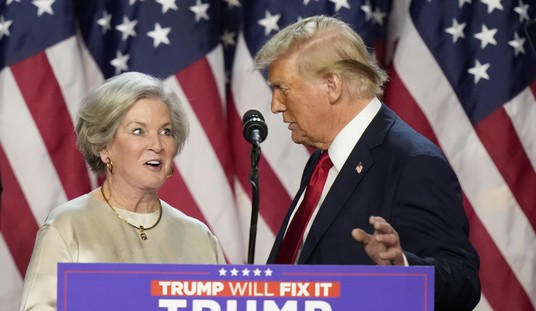First, a trenchant illustration of Marco Rubio's formidable political talent, followed by some analysis of why Rubio supporters ought to be growing a bit anxious with February right around the corner. Here is Rubio's Iowa
Advertisement
Rubio's answer is nearly flawless. He applauds the questioner for having the guts to cut against the grain in a room filled with Christians, he makes a strong appeal to religious pluralism -- which includes non-believers -- and he mounts a stirring, unapologetic defense of his own personal faith. While the main pull quote from this soliloquy might be, "no one's going to force you to believe in God. But no one's going to force me to stop talking about God," it's the final piece of Rubio's answer that strikes me as especially savvy and insightful:
"You shouldn't be worried about my faith influencing me. In fact, I think you should hope that my faith influences me. Here's why: You know what my faith teaches me? My faith teaches me that I have an obligation to care for the less fortunate. My faith teaches me that I have an obligation to love my neighbor. My faith teaches me that I have an obligation for those who are hungry, to help try to feed them. For those who are naked, to help clothe them. My faith teaches me that I need to minster to those in prison. My faith teaches me that if I want to serve Jesus, I need to serve [gestures] each other. And I think you should hope that that influences me."
Recommended
Advertisement
This is simply excellent. He treats a borderline hostile questioner with respect, then builds a case that his Biblically-rooted values are, in fact, compassionate and humanitarian values that can be embraced by believers and doubters alike. In doing so, he flips the terrain of the challenge -- rejecting what could have been a defensive crouch in favor of a proactive explanation for why even an ardent atheist can take comfort in the underpinnings of his worldview. This answer clearly resonates with the heavily churchgoing group of assembled Republican Iowa caucus-goers, but it also holds great appeal for a general election audience that will be significantly less religious overall. It's a heartfelt and skillful answer from Rubio that underscores what an effective communicator and appealing figure he can be. But his supporters have significant cause for concern with February's votes fast approaching. His campaign has begun sketching out their roadmap to victory, explaining it as a 3-2-1 scenario:
According to multiple Rubio allies recently briefed on campaign strategy, the senator’s team has settled on an unconventional path to winning the GOP primary contest. The strategy, dubbed “3-2-1” by some who have been briefed on it, forecasts a sequence in which Rubio takes third place in Iowa on February 1, finishes second in New Hampshire on February 9, and wins South Carolina on February 20. From there, Rubio would be well-positioned in the long haul to win a plurality of voters, and ultimately a majority of delegates, in a three-way contest against Donald Trump and Ted Cruz. This planning represents a concession from Rubio’s brain trust that Cruz and Trump will take the top two spots in Iowa – most likely in that order – and that Trump will win New Hampshire...Rubio’s team is preparing for a different scenario. The senator’s operation — both campaign and super PAC — is anchored by South Carolina veterans who long ago identified their state as his firewall because of their institutional and organizational advantages, and because they viewed it as the best fit for someone without a geographic or ideological foothold in either Iowa or New Hampshire. Rubio’s supporters remain confident in their ability, even without a victory in the first two states, to deliver South Carolina. But to do so they must winnow the field. The way Rubio wins South Carolina, the thinking goes, is if he clears the establishment lane of competitors — Chris Christie, John Kasich, and Jeb Bush — so that center-right Republicans can consolidate behind him to defeat Trump and Cruz.
Advertisement
Perilous, on several levels. Rubio seems pretty well-positioned to finish third in Iowa, where he's the only candidate not named Trump or Cruz polling in the double digits. If Trump's legions of fans are exposed as non-voters and he consequently stumbles, Rubio could potentially finish a stronger-than-expected third, or even second. But if Trump's operation is more robust and effective than anticipated, and he wins Iowa, he could conceivably run the table -- at which point other campaign's strategies are rendered moot anyway. New Hampshire also presents a dicey proposition for Rubio. He's recently fallen into third place in the RCP average there, although that's largely thanks to an outlier poll showing John Kasich leaping to 20 percent. Rubio's bigger problem is that he's more or less statistically tied with four other candidates sitting in the high single-digits to low double-digits...and lagging behind first-place Trump by a wide margin. Worse still, his position both in the Granite State and nationally has eroded in recent weeks, with barrages from Jeb, Christie and Cruz taking a toll. Bush, whose operation and allies have spent tens of millions in ads -- many of them critical of Rubio -- is still flopping badly, but appears to have made incremental gains at Rubio's expense. Let's say Rubio comes in second on February 9, trailing Trump by a fair distance, but edging out Christie and Kasich by a hair. Is there any guarantee that either of those two governors would immediately interpret their top-four finish as a cue to exit the race? What about Bush, who has a lot more money in the bank and a far deeper operation in place in elsewhere?
Advertisement
In other words, even if Rubio executes the "3" and "2" elements of this plan -- with the latter hardly being a safe bet at this point -- will the field winnow as necessary to make the critical final step even plausible? As it stands, Rubio is a distant third in South Carolina, barely ahead of Jeb. If Bush and Kasich and Christie and Carly all drop out before the Palmetto primary, and if the vast majority of their voters all migrate to Rubio, he's got a chance -- especially if figures like Sen. Tim Scott and Gov. Nikki Haley (hmm) throw their political heft behind him. But it's very easy to envision someone like Jeb staying in the race, keeping Rubio's would-be coalition fractured. Couple that with media buzz about winners Trump and/or Cruz on the march, and it's tough to see where Rubio's desperately-needed oxygen comes from. Perhaps most importantly, if any piece of the 3-2-1 puzzle fails to fall into place (3-3-3 seems like an entirely reasonable outcome right now), the Rubio campaign would have pre-scripted their own failure narrative. I'm not sure they'd be able to cleanse themselves of that stink, even if they still believe they've still got a shot. In short, many factors need to break Rubio's way for this strategy to work -- so publicly broadcasting it feels like a significant risk. Which may mean that Team Rubio feels like it has no other choice at the moment. And that's not too far off from desperation. Relatedly and before you go, be sure to read this handy
Advertisement

























Join the conversation as a VIP Member